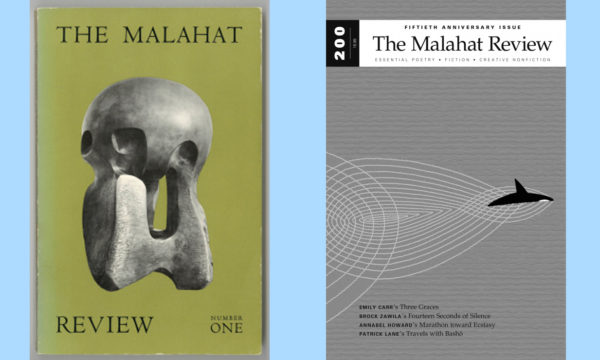Two Hiring Committee members quit amid larger worries for the journal’s future

The first and 200th copies of the Malahat Review, which celebrated its 50th anniversary in 2018. Photos provided
It’s been an anxious few months for The Malahat Review, the prestigious Canadian literary journal with a seemingly uncertain future.
After long-time editor John Barton resigned earlier this year, officials at the University of Victoria decided to limit their search for a new editor to regular UVic faculty members. The move was met with concern, as many members of the university and Victoria writing community alike worried about a loss of a prestigious job opportunity for Canada’s writing community and about diversity among the prospective candidates.
Fears seemed largely assuaged by a meeting held on May 10 at the Greater Victoria Public Library, where UVic officials explained to attendees that the university would steward the journal for three years, relocate The Malahat’s office to the library, and take advantage of on-campus fundraising, marketing, and communication supports.
But even members of The Malahat Review themselves pushed back against the new direction — both decisions made and processes undertaken by a small working group.
The working group, composed of members from each of the Malahat’s four editorial and advisory boards, was instituted in November 2017 in order to guide the journal through its transition phase, and into a new relationship with UVic. It was within this group’s meetings, alongside consultations with the Dean of Humanities and the Dean of Fine Arts, that the decision to hire within the university was made. After coming to a conclusion, the group transitioned into becoming a hiring committee for the next editor.
On June 5, the university announced that Iain Higgins, English professor and member of the Malahat advisory board for eight years, had been selected as the next editor by the committee.
However, the path to his selection was not a smooth one.
Two members quit the hiring committee
Although the working group was small, with fewer than ten members, the committee recently experienced significant changes in personnel. According to emails obtained by the Martlet, two members of the hiring committee resigned after raising concerns about the hiring process to the other members.
In an email to the group, one former member commended the efforts of Margaret Cameron, Associate Dean of Research for the Humanities, who became the chair of the working group and then hiring committee, but decried the lack of diversity among the committee.
“Moving forward, I would urge you to invite more people to the group who not only represent the community of the Malahat, but also are informed by diverse social locations and identities,” they wrote.
“This is not a diverse working group . . . [and its] uniformity does not reflect the readership of the Malahat, nor the list of writers who have been featured in its pages; therefore this group simply does not work, in my eyes.”
The other member says they left the committee after they raised concerns over the lack of diversity among applicants, and their request to cancel interviews in favour of widening the search was denied.
In their emailed resignation, they shared concerns that the journal was being ripped from the Department of Writing.
Replying to the member’s emails, Dean of Humanities Chris Goto-Jones expressed surprise at the comments.
“I confess that I’m slightly mystified by the accusations levelled in this thread. There is no attempt to ‘co-opt’ The Malahat,” Goto-Jones wrote. “Indeed, I’m not even sure what this could mean, since (as far as I’m aware) The Malahat has always been supported through a collaboration between Humanities and Fine Arts, which is also the arrangement now.”
“There are no parallel processes in play; there is no hidden agenda; there are no conspiracies in action (although I can’t speak to conspiracy theories, which are always in action),” Goto-Jones wrote.
“Concerns that were raised . . . are very real.”
Speaking to the Martlet, Cameron denied that any concern about ownership had been raised to her. She did, however, sympathize with the concerns over a lack of diversity.
“On both occasions, when a member left, we committed to ensuring that the concerns that they raised carried forward and that they would inform our decision-making through the process,” Cameron said.
In regards to diversity, Cameron explained the hiring committee had been hampered by its own process when it chose to draw representatives for the committee from members of the Malahat’s boards, which face their own challenges in regards to diversity.
The process was also impacted by time-sensitive situations regarding publication schedules and personal circumstances among individuals at the journal.
Still, Cameron acknowledged more must be done moving forward.
“The concerns that were raised by the members of the committee who left are real, and through this process, what has become very clear to everyone involved is that enhancing the diversity of those who are involved in The Malahat needs to be the priority.”
“A charging bull”
Other concerns have been raised about the hiring group’s operations. One person privy to the process worried that things were progressing too quickly without enough consideration of potential repercussions.
The individual, who wished to remain anonymous, contends that the working group had not properly instituted any of the recommendations from the community meeting on May 10. According to them, the working group was scheduled to have a debrief of that meeting on Wednesday, May 30 — immediately before an interview for the position of editor was to take place.
“It feels like this working group is a charging bull and it’s going to plow right through the Malahat and it won’t leave anything recognizable behind,” the person said. “It feels like The Malahat will slowly fail under successive leadership that is not well-suited for it.”
Responding to those concerns, Cameron pointed out that the process for replacing the Editor has been ongoing since November, with plenty of meetings and consultations throughout. Cameron did confirm that the group’s debriefing session took place on May 30, but said that getting the hiring committee members together (and each meeting must have every member present) in the middle of exam and conference season was incredibly difficult.
But the individual is worried that without more community involvement, the future of the journal could be in danger.
“This publication is actually pretty fragile. I think that’s been understood, but it’s got a tenuous existence and I think, at the same time, there’s this sense that even if it’s got this change in leadership it’s going to survive — it’s going to transform and it’s going to be greater than it was before,” they said. “Change for change’s sake — I mean it’s a cliché — but it’s not always good.”
This article has been updated to correct the fact that John Barton resigned, not retired, from his position at The Malahat Review. We sincerely regret the error.








